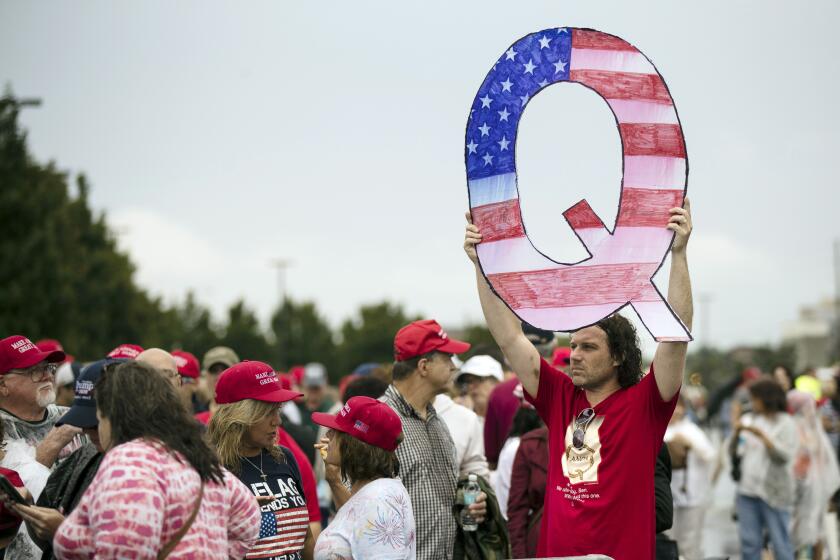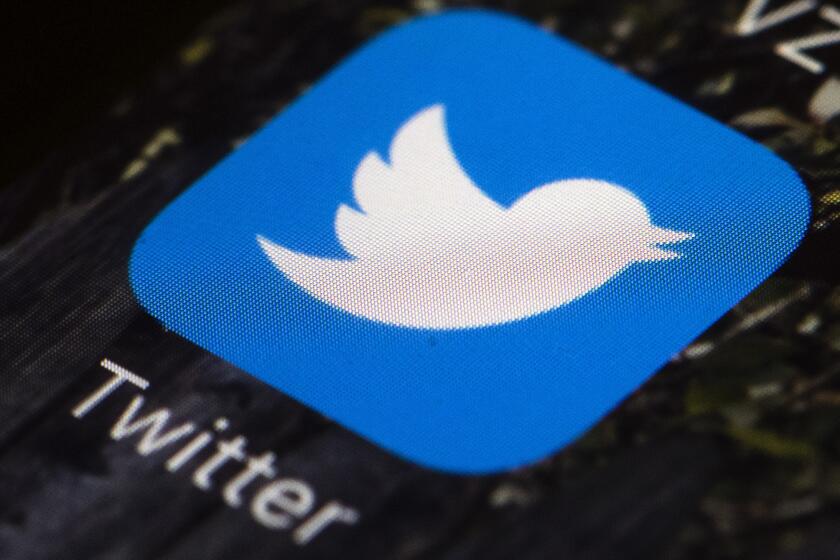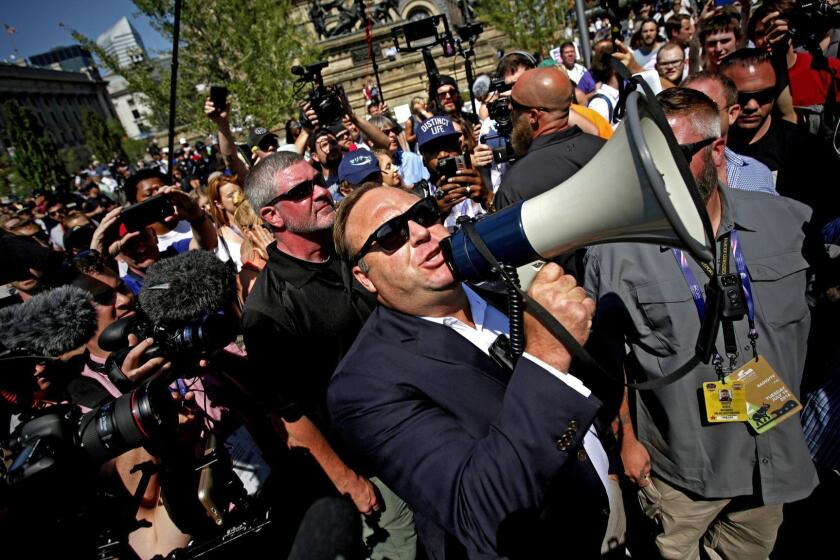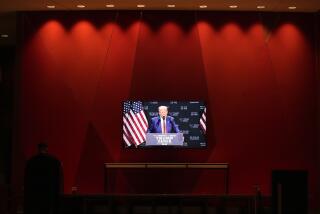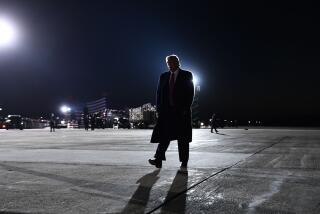Trump praises QAnon conspiracists, who ‘like me very much’
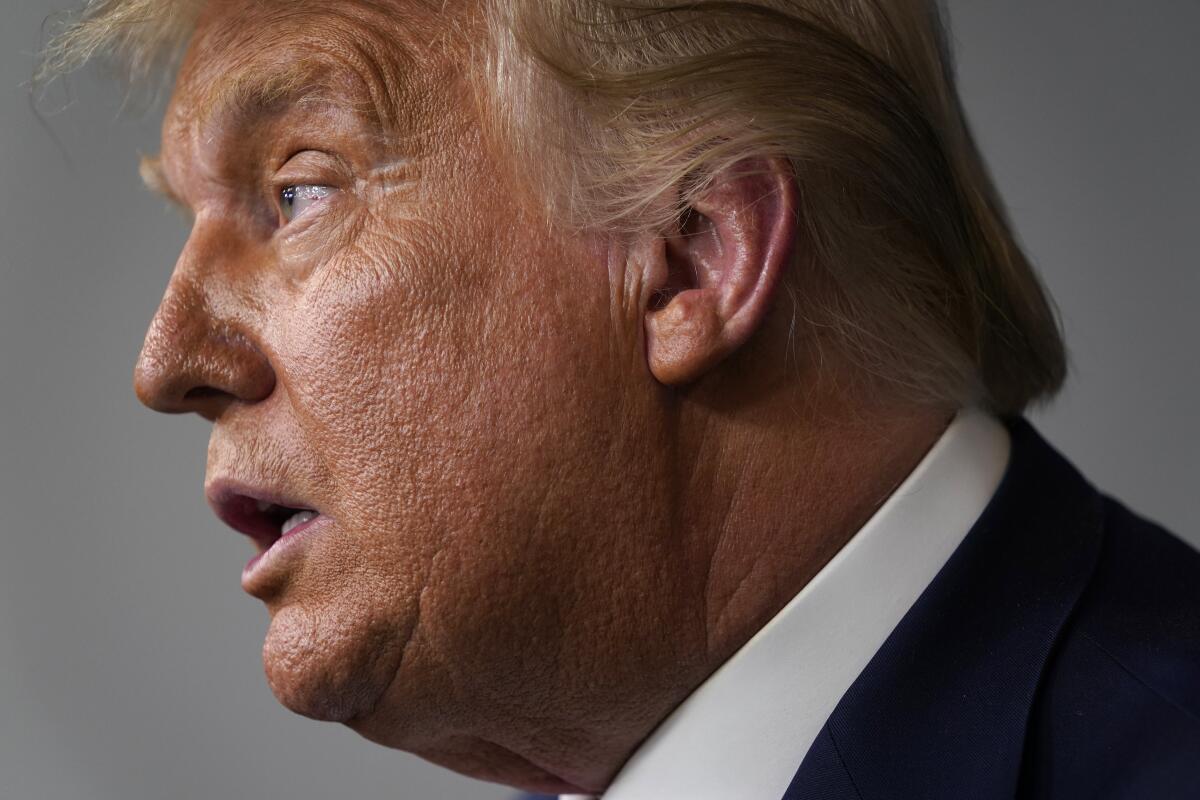
WASHINGTON — President Trump on Wednesday praised the supporters of QAnon, a convoluted, pro-Trump conspiracy theory, and suggested that he appreciates their support for his reelection.
Speaking during a news conference at the White House, Trump courted the support of those who put stock in the conspiracy theory, saying, “I heard that these are people that love our country.” It was Trump’s first public comment on the subject and continued a pattern of his apparent unwillingness to condemn extremists who support his candidacy.
QAnon has ricocheted around the darker corners of the internet since late 2017 but has been creeping into mainstream politics more and more. The baseless theory centers on an alleged anonymous, high-ranking government official known as “Q” who shares information about an anti-Trump “deep state” often tied to satanism and child sex trafficking.
Trump insisted he hadn’t heard much about the movement “other than I understand they like me very much” and “it is gaining in popularity.”
Trump has retweeted QAnon-promoting accounts. Shirts and hats with QAnon symbols and slogans are not uncommon at his rallies.
An FBI bulletin last May warned that conspiracy-theory-driven extremists have become a domestic terrorism threat. The bulletin specifically mentioned QAnon. Earlier last year, the Southern Poverty Law Center warned that the movement was becoming increasingly popular with anti-government extremists.
QAnon is the baseless conspiracy theory that President Trump is battling a powerful group of elites who, among other crimes, run a child sex ring.
Trump’s comments were condemned by the campaign of his Democratic rival, former Vice President Joe Biden.
“After calling neo-Nazis and white supremacists in Charlottesville ‘fine people’ and tear-gassing peaceful protesters following the murder of George Floyd, Donald Trump just sought to legitimize a conspiracy theory that the FBI has identified as a domestic terrorism threat,” said Biden spokesman Andrew Bates. “Our country needs leadership that will bring us together more than ever to form a more perfect union. We have to win this battle for the soul of our nation.”
Former Florida Gov. Jeb Bush, who challenged Trump for the GOP nomination in 2016, also criticized the president, tweeting: “Why in the world would the President not kick Q’anon supporters’ butts? Nut jobs, rascists, [sic] haters have no place in either Party.”
Pressed on QAnon theories that Trump is allegedly saving the nation from a satanic cult of child sex-traffickers, Trump claimed ignorance, but asked, “Is that supposed to be a bad thing? ... If I can help save the world from problems, I’m willing to do it,” he said.
Twitter said it would ban accounts associated with QAnon content, as well as block associated URLs from being shared on the platform.
QAnon supporters were quick to celebrate Trump’s comments on social media, with many calling them a validation of their views. Many have long contended that he sends them coded messages of support, and on Twitter, one user claimed that Trump’s choice of a pink tie Wednesday was another signal of support.
Within minutes, dozens of Instagram users began celebrating Trump’s acknowledgment of the conspiracy theory at the White House lectern, uploading videos of him.
“Well we’ve been waiting for this moment for a while, to put it mildly thank you @realDonaldTrump,” one Instagram user wrote to her 19,000 followers in a post of Trump’s exchange. The video was viewed more than 1,000 times in just 30 minutes.
“Holy Smokin Q,” another tweeted. “Our President was asked 2 questions about the Qanon movement TODAY!! We LOVE you President Trump.”
On Parler, a right-wing platform popular with some Trump supporters, one QAnon supporter posted a photo of Trump and a bald eagle.
Trump’s comments came a week after he endorsed Marjorie Taylor Greene, who won her GOP House primary runoff in Georgia last week. Greene called the QAnon conspiracy theory “something worth listening to and paying attention to” and called Q a “patriot.” Trump praised her as a “future Republican Star.”
Trump has a long history of advancing false and sometimes racist conspiracies, including last week, when he gave credence to a highly criticized op-ed that questioned Democrat Kamala Harris’ eligibility to serve as vice president even though she was born in Oakland.
Asked about the matter, Trump told reporters he had “heard” rumors that Harris, a Black woman and U.S.-born citizen whose parents were immigrants, does not meet the requirement to serve in the White House. The president said he considered the rumors “very serious,” but later he and his campaign indicated they were not making an issue of the claim. Constitutional lawyers have dismissed it as nonsense.
For more than a decade, tech companies have built massive social media platforms on a simple principle: Take the power of publishing that was long reserved for traditional outlets like newspapers and television stations, and give it to everyone, without censorship.
Facebook announced just hours before Trump’s statements that it was banning some QAnon Facebook groups and accounts.
But social media had already been used for years to fuel the conspiracy theory’s rise, with private and super-secret Facebook groups where members sometimes post hundreds of times a day. QAnon believers often peddle a number of conspiracy theories, from claims that John F. Kennedy Jr. isn’t really dead and is staging a public comeback, to baseless speculation about celebrities who have secretly been arrested for trafficking children for sex.
Mentions of hashtags that social media users use to promote the QAnon conspiracy theory have spiked in public Facebook pages and groups since July, generating millions of interactions, according to an Associated Press analysis of data from Facebook-owned CrowdTangle.
The conspiracy theory gained a larger online following in recent weeks, when prominent QAnon social media accounts pushed a bizarre and baseless conspiracy theory that online retail giant Wayfair was trafficking children through pricey storage cabinets that are for sale on its site. Some of the social media users shared the names and photos of missing children from around the country as proof of the scheme, even though many of the children have since been found.
Last month, researchers at online misinformation firm NewsGuard found that the QAnon conspiracy theory is gaining traction in Europe, with social media users pushing it on Facebook and Twitter.
More to Read
Get the L.A. Times Politics newsletter
Deeply reported insights into legislation, politics and policy from Sacramento, Washington and beyond. In your inbox three times per week.
You may occasionally receive promotional content from the Los Angeles Times.
